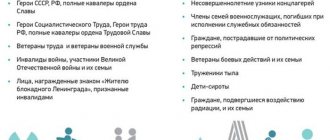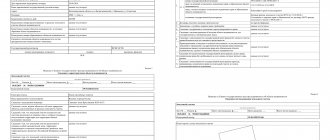How to obtain the status of a low-income family in 2020 is of interest to many whose income is not large enough to easily support not only themselves, but also their children. Naturally, financial difficulties are familiar to many, especially in modern realities, but if temporary inconvenience becomes a permanent phenomenon, something needs to be done. In such cases, the state offers its assistance. People whose per capita income does not reach the subsistence level receive a special status - low-income, in accordance with Federal Law 44-FZ. As a result, the state offers them special benefits and allowances to help create more comfortable living conditions. But since obtaining the status in question presupposes certain requirements, let’s talk about this in more detail.
When can you apply for low-income status and how to get it?
A low-income citizen may qualify for certain benefits from the state. But in order to receive them, you need to make sure whether the family is really in such a dire situation. To qualify for low-income status, you must meet several criteria at once. In particular, the following is taken into account:
- family composition;
- what property is in the possession of its members;
- average income.
As already mentioned, only persons whose average income is lower than the subsistence level in the region where they live can obtain the status in question. Moreover, you can make sure that all the necessary indicators are available on your own, without waiting for the relevant authorities to do this.
In addition, it is the applicant who must collect all documents and certificates in order to be granted a new status. So why not take advantage of this and conduct your own calculations?
Families with what composition can apply for status
Registration of low-income status is available to almost everyone who needs it. But most often people ask for help:
- Large families. They have three or even more children. The composition can be complete (mother and father) or incomplete (one parent).
- Incomplete. There is a child or several in the family, but only one parent is involved in their upbringing and maintenance.
- Families with disabled people. In particular, a child or one of the parents may be disabled.
- Where is the adopted child?
- If the child is raised not by parents, but by grandparents (there are no parents).
Even though the rules seem obvious, people sometimes get confused about who can be included in the family. Therefore, let us clarify what the definition is in the legal sense:
- people live together (registered in one place);
- are engaged in general housekeeping;
- All existing expenses and incomes are common to them.
That is, not only children and parents, but also grandparents, brothers and sisters, and adoptive parents can be considered a family. But only if the above conditions are met. The following persons are excluded:
- military conscripts;
- people deprived of their freedom;
- persons who are subject to compulsory treatment by court decision;
- citizens who are fully provided for by the state.
There are other nuances, but they are individual and are decided in each individual case.
Who is in need?
It is possible to identify a group of people who are classified as needy by law. This should include:
- Persons who live in a rented apartment where the number of square meters is less than necessary. This can include not only the tenant, but also his entire family, since everyone will have the status of a needy person.
- Citizens who live in dilapidated and dilapidated houses are also required to provide this status. Safe living conditions are violated here, which is a violation of the law.
- If a person has to live in the same area with a citizen who has a contagious or serious disease. This includes everyone living in the living space who is at risk.
Income of low-income citizens
Another very important category is total income. But there are special rules for counting it. In particular, the total amount of money is divided among all family members, and they find out whether it is below the average minimum level.
It turns out what income all family members contribute to the general budget for the last three months before applying. The following sources of income are taken into account:
- wages and other financial payments that are provided for in remuneration;
- average earnings that citizens retain in situations provided for by law;
- compensation that a citizen receives when performing public or state work. responsibilities;
- severance pay;
- social benefits (this includes pensions, benefits for the unemployed, insurance payments, various additional payments and more);
- funds received from owned property (for example, when renting out an apartment, etc.).
Other types of income may also be taken into account, ranging from charitable material assistance to alimony, gifts and inheritance. But there are incomes that will not be taken into account. For example:
- insurance payments of a one-time nature, which were paid in connection with compensation for losses or to pay for rehabilitation;
- social assistance from the state.
Total income does not take into account taxes and other fees.
Living wage
To understand whether low-income families can qualify for benefits, it is important to clarify what the minimum amount is. The calculation is simple - income for 3 months is summed up, and the resulting amount is divided by three. The result is the following numbers:
| For one person | 10329 rubles |
| For a person who is able to work | 11163 rubles |
| Acceptable minimum for pensioners. | 8506 rubles |
| For one child | 10160 rubles |
Divide the result by the number of family members. If it is below the indicated figures, there is every reason to receive the status of the poor.
What documents need to be collected to obtain status
In order for you to receive support, you need not only to contact the relevant authorities, but also to prepare documents confirming the need for such support. The standard package of papers that a potential low-income person should have is as follows:
- certificate of family composition;
- birth certificates of children (minors);
- documentation confirming income for three months (bank details, etc.);
- work books of working people, and the unemployed can bring certificates from the employment center;
- if you have a disability, you need a certificate from the ITU;
- personal documents of each family member (passport, TIN, etc.);
- Marriage certificate;
- real estate documents or occupancy agreement (if the property is rented/rented).
This list is not complete, as other papers may be required depending on the situation. You can check the list of required documentation with the social worker you contact for help.
In addition, it is the social worker who must make sure that the person has brought all the documents necessary in his case. For example, additional paperwork will be required if a family member is in prison, missing in action, or serving in the military.
How to get in line for a preferential mortgage for a young family
- written statement;
- identity documents of adults and children;
- bank account details for transferring subsidies;
- documents confirming the place of registration of each family member (extract from the house register);
- information about how many meters per person;
- documents officially confirming income;
- certificates of ownership if there is real estate;
- certificate of timely payment of utilities;
- documents on work activity, certified accordingly;
- documents confirming the lack of living space;
- marriage certificate (divorce certificate).
- Benefit in the form of a reduced interest rate.
- Lending for the maximum period.
- Providing a deferment on interest payments or credit holidays with the birth of a child.
- Deferment of first payments for up to 2 years if housing was purchased in a house under construction. Interest payments are usually not covered.
- There are no commissions.
- Involving not only spouses, but also other citizens as co-borrowers, whose income is taken into account when submitting an application.
More to read: Help for families with many children Building materials in the Lipetsk Region
Assignment procedure
Having collected the entire package of documents, a person needs to go to the local branch of the Ministry of Social Protection. There he will be given a current application form. Having compiled it, you need to transfer the collected papers and application to a specialist. He checks all copies against the originals to ensure there are no errors or fraud. This makes it easier to check if all the papers are included.
Then the procedure begins, during which:
- the application is being processed;
- the accuracy of the data is checked;
- information is entered into the database, etc.
Usually all this work takes 10 days. After this period, a written notice is sent to the applicant indicating whether he can rely on support or not.
What benefits and benefits can a low-income family claim?
The amount of assistance to low-income families depends on what kind of support they are applying for:
- Federal. People will not pay income tax, students will receive scholarships, and applicants will enter universities on favorable terms.
- Regional. In this case, parents will receive benefits for young children, pay for utilities on preferential terms, and more.
Let's look at regional assistance in more detail, since it has many nuances in how much and when the poor will receive support:
- In the housing and communal services sector. The type of support in question is relevant for all regions. It provides for the establishment of a certain limit for paying utility bills. Payments above this limit do not arrive, but there may be less. This minimum is calculated as a percentage. If the payment exceeds the permissible limit, the family will be paid compensation.
- Help for children. Families with minors will receive it. Maximum assistance is in the first 1.5 years after the birth of the child, and then until the age of 18 (while schooling continues), but the amount is less. Help is also provided at the birth of a baby. Its size depends on the region, and sometimes on the city. For example, in Moscow it will be higher. In some regions, children can receive free meals in schools and kindergartens, travel free on public transport, etc.
In addition to the above, low-income families, or rather its members, can receive free legal assistance, take out loans for housing with more favorable conditions, and also receive land outside the general queue.
Housing for a large family
You need to submit an application to the executive committee at the place of registration of those in need of improved housing conditions <18>. If you are registered at your place of work or service, then you need to contact the executive committee at the location of the relevant organization <19>. Loans and subsidies are allocated to large families out of turn <20>.
The executive committee sends a copy of the decision to allocate a subsidy or to be included in the list for receiving a loan to OJSC Savings Bank Belarusbank <23>. Based on the decision, the bank will enter into a loan agreement with you or an agreement to open a special “Subsidy” account <24>. Both the loan and the subsidy are provided in non-cash form. That is, the funds will be transferred to special bank accounts, and then to the accounts of the developer or home seller.
16 Apr 2020 stopurist 227
Share this post
- Related Posts
- Is it possible to conclude a Land Lease Agreement if the Land is Seized?
- Agreement on assignment of debt between individuals sample
- What benefits does a federal labor veteran have in 2019 in Tyumen?
- What benefits are available to labor veterans of the Stavropol Territory in 2018?
In what cases will you get a refusal?
The prospect of monthly payments and other benefits is attractive if the average family income is very low. But there are situations when low-income status is denied. This can happen in the following cases:
- the information provided to social services was unreliable;
- an error was made in the income certificate;
- certificates and other documents were prepared incorrectly;
- documents submitted to the social service were expired;
- when transferring the documents, the applicant did not have the originals with him or the copies were not certified by a notary;
- When writing the application, mistakes were made.
Even if you received a refusal, but your family’s financial condition has still not stabilized, no one forbids you from contacting social services again, but avoiding previous mistakes.
Needy Family This
If two or more children are born at the same time, a family that has become large has the right to free help from a nanny in child care, not exceeding 40 hours a week, until the children reach the age of 3 years . There is also the right to receive food for children under the first 2 years of life.
To receive the above benefits, you must submit an application to the local executive and administrative body at the place of registration of those in need of improved housing conditions. If you are registered at your place of work or service, you need to contact the executive committee at the location of your organization.









